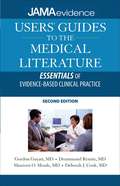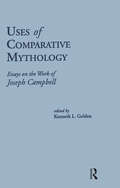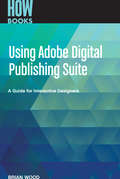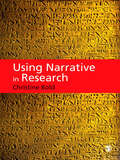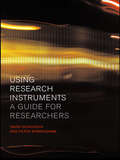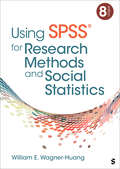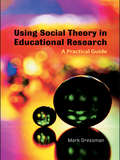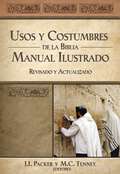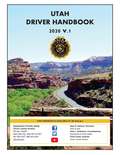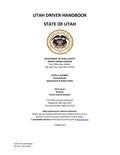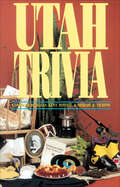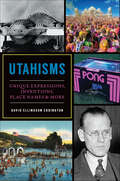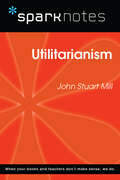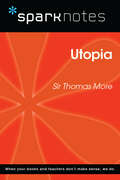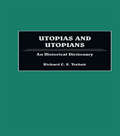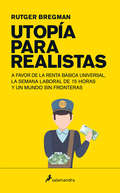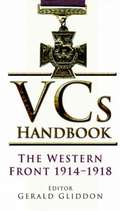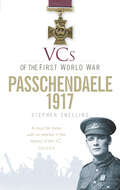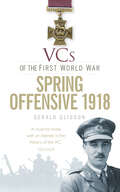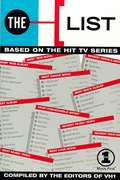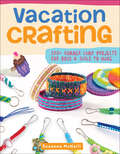- Table View
- List View
Users' Guides to the Medical Literature: Essentials of Evidence-Based Clinical Practice (Second Edition)
by The Evidence-Based Medicine Working Group EditorsEvidence-based medicine involves the careful interpretation of medical studies and its clinical application. And no resource helps you do it better-and faster-than Users' Guides to the Medical Literature: Essentials of Evidence-Based Clinical Practice. This streamlined reference distills the most clinically-relevant coverage from the parent Users' Guide Manual into one highly-focused, portable resource. Praised for its clear explanations of detailed statistical and mathematical principles, The Essentials concisely covers all the basic concepts of evidence-based medicine--everything you need to deliver optimal patient care. It's a perfect at-a-glance source for busy clinicians and students, helping you distinguish between solid medical evidence and poor medical evidence, tailor evidence-based medicine for each patient, and much more. Now in its second edition, this carry-along quick reference is more clinically relevant--and more essential--than ever!
Uses of Comparative Mythology: Essays on the Work of Joseph Campbell (Routledge Library Editions: Myth Ser. #3)
by Kenneth L. GoldenThis collection, first published in 1992, offers critical-interpretive essays on various aspects of the work of Joseph Campbell (1904-1987), one of a very few international experts on myth. Joseph Campbell examines myths and mythologies from a comparative point of view, and he stresses those similarities among myths the world over as they suggest an existing, transcendent unity of all humankind. His interpretations foster an openness, even a generous appreciation of, all myths; and he attempts to generate a broad, sympathetic understanding of the role of these 'stories' in human history, in our present-day lives, and in the possibilities of our future.
Using Adobe Digital Publishing Suite
by Wood BrianUsing Adobe Digital Publishing Suite is for those who want to create apps for devices like iPad using Adobe InDesign and Adobe Digital Publishing Suite. In this book, we will cover the entire creation process from designing the app in InDesign to uploading it to an app store. The tips and notes along the way will give you extra insights or faster ways to do things, as well as help you avoid typical pitfalls.
Using Adobe Digital Publishing Suite: A Guide for Interactive Designers
by Wood BrianUsing Adobe Digital Publishing Suite is for those who want to create apps for devices like iPad using Adobe InDesign and Adobe Digital Publishing Suite. In this book, we will cover the entire creation process from designing the app in InDesign to uploading it to an app store. The tips and notes along the way will give you extra insights or faster ways to do things, as well as help you avoid typical pitfalls.
Using Android as a ‘Reading and a Writing Device’ - WBM (World Bank Modules)
by BookshareThis comprehensive document focuses on leveraging Android devices as efficient reading and writing tools for individuals with print disabilities, particularly visual impairments or dyslexia. It begins by detailing the setup and customization of TalkBack, the screen reader, elucidating settings, gestures, and keyboard shortcuts to enhance accessibility. Additionally, it covers the use of Magnification, enabling users to zoom in and out of the screen with tailored settings and gestures. The document introduces Dolphin EasyReader, a versatile reading app supporting various file formats like EPUB, Word, and audio books, offering synchronization, navigation, and customization features. It also guides users on writing in different languages through an external keyboard, providing options for phonetic or traditional typing methods. Furthermore, it delves into browsing the web using Chrome alongside TalkBack, emphasizing reading controls, keyboard shortcuts, and simplified view access for efficient web navigation. Complemented by video tutorials, resource links, and annexures, this document serves as a comprehensive guide, empowering individuals with print disabilities to maximize Android devices as effective tools for reading and writing.
Using Narrative in Research
by Christine BoldUsing Narrative in Research by Christine Bold provides an accessible, easy-to-understand guide to the theory and practice of the use of narrative in research. Written with those new to narrative in mind, this book will enable readers to understand the origins of narrative traditions and to plan and carry out a narrative study of their own. Christine Bold's book examines narrative approaches across a range of research contexts and disciplinary boundaries and will be of equal value to practitioners and academic students and researchers alike. Drawing on a range of real-life examples of narrative studies, Using Narrative in Research will enable readers to provide a sound justification for adopting a narrative-based approach and will help them to write about and write up narrative in research. This book examines: * How we design research projects with a narrative approach * Ethics * Narrative thinking * Collecting narrative data * Analysing narrative data * Representation in narrative analysis * Reporting and writing up narrative research.
Using Research Instruments: A Guide for Researchers (Routledge Study Guides)
by Peter Birmingham David WilkinsonClear, accessible and practical, this guide introduces the first-time researcher to the various instruments used in social research. It assesses a broad range of research instruments - from the well-established to the innovative - enabling readers to decide which are particularly well suited to their research.The book covers: questionnaires interviews content analysis focus groups observation researching the things people say and do. This book is particularly suitable for work-based and undergraduate researchers in education, social policy and social work, nursing and business administration. It draws numerous examples from actual research projects, which readers can adapt for their own purposes. Written in a fresh and jargon-free style, the book assumes no prior knowledge and is firmly rooted in the authors' own extensive research experience.Using Research Instruments is the ideal companion volume to The Researcher's Toolkit. Together they offer a superb practical introduction to conducting a social research project.
Using SPSS® for Research Methods and Social Statistics
by William E. Wagner-HuangThis is the perfect companion for students who are learning to use the SPSS software to interpret and manage data. Students will appreciate author William E. Wagner-Huang’s step-by-step explanations of SPSS operating procedures and introductory statistical operations. The Eighth Edition uses version 29 of the software and incorporates results from the 2022 General Social Survey (GSS) as a dataset used in examples throughout the book. In response to user feedback, the author has expanded the sections on ANOVA and chi-square. The GSS datasets and codebooks for use with the text are available on an accompanying website.
Using SPSS® for Research Methods and Social Statistics
by William E. Wagner-HuangThis is the perfect companion for students who are learning to use the SPSS software to interpret and manage data. Students will appreciate author William E. Wagner-Huang’s step-by-step explanations of SPSS operating procedures and introductory statistical operations. The Eighth Edition uses version 29 of the software and incorporates results from the 2022 General Social Survey (GSS) as a dataset used in examples throughout the book. In response to user feedback, the author has expanded the sections on ANOVA and chi-square. The GSS datasets and codebooks for use with the text are available on an accompanying website.
Using Social Theory in Educational Research: A Practical Guide
by Mark DressmanUsing Social Theory in Educational Research is organised to help practising educators and novice researchers who have little familiarity with social theory to: be introduced to major schools of social theory, their basic concepts, and their general applicability to educational issues develop an understanding of and appreciation for its potential to improve their own practice gain practical insight into how theory can function as a warrant, or support, for data interpretation through the use of multiple practical examples, learn how to integrate theory into their own work more effectively Selected Contents: 1. Getting Theoretical 2. An Illustrated Tour of How Theory Works (and Doesn’t Work) in Educational Research 3. Framing Research Theoretically, Part One: Planning and Data Collection 4. Framing Research Theoretically 5.When Research Meets Research
Usos y costumbres de la Biblia: Manual ilustrado, revisado y actualizado
by J. I. PackerDeje que las Escrituras cobren vida en este estudio de unvolumen de la vida y los tiempos de la Biblia que todos deben tener.Esta guíaenciclopédica totalmente ilustrada de los usos, costumbres y épocas de laBiblia pone una cantidad impresionante de información al alcance de sus dedos. Másde cuarenta secciones abarcan gente de la Biblia y cómo vivía, desde la vida enfamilia hasta la ley y el transporte. Este volumen de precio cómodo ofrece másde 6,000 temas y datos, haciendo que las maravillas de las culturas bíblicassean más accesibles que nunca.
Utah Driver Handbook
by Utah Department of Public Safety - Driver License Division<p>This manual contains the rules which should be followed when operating any vehicle on Utah roads. The operator of a bicycle must obey the same rules of the road, and has the same rights and duties as the operator of a motor vehicle or other vehicle. <p>NOTE: Please beware of imitator websites. For accurate Driver License information and forms visit: dld.utah.gov.</p>
Utah Trivia
by Allan Kent Powell Miriam B. MurphyAn extensive and entertaining question-and-answer trivia book about the amazing Beehive State.Learn all about the great state of Utah! This engaging book is filled with interesting questions and answers about well-known and not-so-well-known facts about this colorful, historic state. Designed for use in a wide variety of settings—home, office, school, parties, and more—this book is divided into topics like geography, entertainment, history, arts & culture, sports & leisure, and science & nature. Inside, you’ll discover more about the fascinating Beehive State like:The first woman elected a judge in UtahThe first two lines of Utah’s state songWhere in Utah you can see tropical fishWhich silent-film era star was born in Logan, UtahAnd much moreReadily adaptable for use with trivia format games, Utah Trivia will provide hours of entertainment and education.
Utahisms: Unique Expressions, Inventions, Place Names & More
by David Ellingson EddingtonUtahisms: Unique Expressions, Inventions, Place Names and more ranges from the characteristic to the bizarreThe Beehive State's iconic vistas are singular and distinctive. So too are its colloquialisms, peculiar place names and landmark firsts. Confusion from local dialect ultimately thwarted a would be robber in Salt Lake City. The proper pronunciation of Tooele might surprise visitors, while residents still debate its origins. And, phrases once thought to be solely Utahn often prove otherwise. The world's first department store was born out of xenophobia and religious persecution in 1869. Martha Hughes Cannon followed through on Brigham Young's encouraging women to become physicians. She later became the first female state senator in the United States, defeating her own husband. Examining everything from phonetics to history, BYU Linguistics Professor David Eddington reveals the roots of what is truly, uniquely Utah.
Uterine Fibroids: The Complete Guide (A Johns Hopkins Press Health Book)
by Elizabeth A. StewartProviding the most reliable and up-to-date information on this very common and difficult disorder, Dr. Stewart helps women understand uterine fibroids and make the best possible choices about their care.You've called in sick today. Your back and legs hurt. Your abdomen is bloated and more than a little uncomfortable. You are having your period, and the bleeding is so heavy you can't even think about leaving the house. You have uterine fibroids.One in every four women see their lives affected by uterine fibroids, which can cause heavy bleeding, abdominal bloating, pain, and infertility. The symptoms can be mildly annoying or life altering in severity. Until recently, hysterectomy was the only way to cure fibroids, and each year more than 200,000 hysterectomies are performed in the United States to treat these noncancerous growths. But hysterectomy isn’t always the best solution. The procedure can be devastating for women who were planning to get pregnant, and it is a significant surgery for anyone. In this comprehensive and compassionate guide, Dr. Elizabeth A. Stewart helps women understand the treatment options now available.An internationally recognized expert on fibroids, Dr. Stewart describes all the available medical and surgical treatments as well as alternative and complementary therapies. In addition to hysterectomy, she explains uterine artery embolization (UAE), noninvasive focused ultrasound (FUS), and innovative hormone treatments. Simple diagrams and photographs illustrate the condition—and its treatment. Dr. Stewart encourages women with fibroids to learn as much as they can before choosing a treatment plan. Providing the most reliable and up-to-date information on this very common and difficult disorder, she helps women understand uterine fibroids and make the best possible choices about their care.
Utilitarianism (SparkNotes Philosophy Guide)
by SparkNotesUtilitarianism (SparkNotes Philosophy Guide) Making the reading experience fun! SparkNotes Philosophy Guides are one-stop guides to the great works of philosophy–masterpieces that stand at the foundations of Western thought. Inside each Philosophy Guide you&’ll find insightful overviews of great philosophical works of the Western world.
Utopia (SparkNotes Philosophy Guide)
by SparkNotesUtopia (SparkNotes Philosophy Guide) Making the reading experience fun! SparkNotes Philosophy Guides are one-stop guides to the great works of philosophy–masterpieces that stand at the foundations of Western thought. Inside each Philosophy Guide you&’ll find insightful overviews of great philosophical works of the Western world.
Utopias and Utopians: An Historical Dictionary of Attempts to Make the World a Better Place and Those Who Were Involved
by Richard C. S. TrahairUtopian ventures are worth close attention, to help us understand why some succeed and others fail, for they offer hope for an improved life on earth. Utopias and Utopians is a comprehensive guide to utopian communities and their founders. Some works look at literary utopias or political utopias, etc., and others examine the utopias of only one country: this work examines utopias from antiquity to the present and surveys utopian efforts around the world. Of more than 600 alphabetically arranged entries roughly half are descriptions of utopian ventures; the other half are biographies of those who were involved. Entries are followed by a list of sources and a general bibliography concludes the volume.
Utopía para realistas: A favor de la renta básica universal, la semana laboral de 15 horas y un mundo sin fronteras
by Rutger BregmanUn ensayo ágil para reflexionar sobre el tipo de sociedad en la que vivimos y cómo resolver la gran paradoja de nuestro tiempo: que en la era de la abundancia, millones de personas sufran escasez. ¡Pongámonos a pensar. Soñemos con la Utopía! Fruto del espectacular avance de la ciencia en los últimos decenios, la globalización está transformando de forma radical el orden social y económico del siglo XXI. En un mundo más pequeño y conectado, el progreso y el bienestar llegan hasta el último rincón del planeta, rescatando de la miseria a cientos de millones de personas. Sin embargo, la nueva economía virtual, sumada a la progresiva sustitución del trabajo humano por robots y computadoras, ha generado también un incremento de la desigualdad de tal dimensión que preocupa incluso a quienes no la padecen. La distribución del trabajo y la acumulación de la riqueza se ha distorsionado, tensando a la sociedad hasta el punto de asomarse al abismo de la ruptura. La incertidumbre y el desconcierto se instalan en la gente y los políticos no ofrecen una respuesta racional sino al contrario, algunos apelan a las emociones más primarias. No la ofrecen porque no la tienen, y no la tienen, sencillamente, porque no son capaces de imaginar un sistema diferente. Este libro, que ya ha provocado un impacto considerable en su versión digital abreviada, llama a encarar el desafío desde una óptica tan audaz como realista. Rutger Bregman no propone recetas milagrosas ni fórmulas magistrales. Reconoce las dificultades que entraña un cambio profundo del modelo social, y está convencido de que éste no surgirá de un genio solitario ni de ningún grupo de iluminados, sino de arraigar en la conciencia colectiva la idea de que otro modelo es posible y beneficioso para todos. La crítica ha dicho...«Brillante, completo, verdaderamente esclarecedor y sumamente legible. De lectura obligatoria para quienes se preocupan por las injusticias de la sociedad actual y quieren contribuir a remediarlas.»Zygmunt Bauman «Si estás aburrido de debates trillados y trasnochados sobre derechas e izquierdas, disfrutarás del pensamiento audaz, las ideas frescas, la prosa vívida y los argumentos basados en datos que contiene este libro.»Steven Pinker «Un libro brillante, que todos deberían leer. Bregman nos muestra que hemos estado mirando el mundo del revés. Al darle la vuelta, de repente, atisbamos nuevos caminos para avanzar. Si conseguimos que suficiente gente lea este libro, el mundo empezará a ser un lugar mejor.»Richard Wilkinson, coautor de Desigualdad: Un análisis de la (in)felicidad colectiva «Antes de rechazar la idea de la renta básica universal, reflexionemos con calma sobre las condiciones concretas de su aplicación. Un proyecto así puede ser económicamente factible y socialmente audaz. Y, contrariamente a lo que alegan quienes confunden solidaridad con farniente, podría suponer una revalorización del trabajo y de los salarios bajos, que mediante este ingreso se beneficiarían de un verdadero derecho a la formación y de un aumento automático de su sueldo neto.»Le Monde, 25 de enero de 2017. Firmado por Antoine Bozio, Thomas Breda, Julia Cagé, Lucas Chancel, Elise Huillery, Camille Landais, Dominique Méda, Thomas Piketty, Emmanuel Saez y Tancrède Voituriez
VCs Handbook: The Western Front 1914-1918
by Gerald GliddonOn the Western Front during the First World War, 490 men won the British Empire's highest award for gallantry, the Victoria Cross. A companion for any visitor to the First World War battlefields in France and Flanders, this reference book lists every VC recipient from 1914 to 1918 in alphabetical order.
VCs of the First World War: Passchendaele 1917 (VCs of the First World War)
by Stephen SnellingOf all the costly campaigns fought across the Western Front during the First World War, none strikes a more chilling chord than Passchendaele. Even now, more than ninety years on, the very mention of the name is enough to conjure up apocalyptic images of desolation and misery on a quite bewildering scale – humanity drowning in a sea of mud. Passchendaele has come to serve as a symbol of the folly and futility of war, chiefly remembered for its carnage and profligate waste of human lives. It also stands as testament to the endurance and extraordinary courage displayed by men of all ranks and nationalities. During the 3 ½ month long struggle, which claimed the lives of more than 60,000 British and Commonwealth servicemen, 61 men were adjudged to have performed deeds worthy of the Empire’s highest award for valour – the Victoria Cross. Men from Australia, Canada, New Zealand and South Africa were among their number, alongside men from England, Ireland, Scotland and Wales. They came from all walks of life, counting humble privates and, for the first time, a general among their ranks. This is a lasting memorial to a body of men who deserve to be numbered among the bravest of the brave.
VCs of the First World War: Spring Offensive 1918
by Gerald GliddonAt the end of 1917, after three years of trench warfare on the Western Front, the Allied armies of Britain and France, and those of their main opponent, Germany, had reached a point of exhaustion and hibernation. On March 21 1918, the German Army launched a massive assault on the Western Front, hurling fifty-nine divisions into battle against the British Fifth Army, smashing through British lines and advancing 40 miles per week. More offensives were to follow throughout the spring, including at Aisne and Marne, with the aim of ending the war before American forces could reach the Continent and reinforce the Allied lines. Nevertheless, although the German Army left the British Army reeling, the Tommies retreated in good order and fought all the way. It was during these bloody battles, which lasted until July 1918, that fifty-seven men stood out for acts of extraordinary daring and bravery. To these men the highest military honour was awarded – the Victoria Cross. This book reveals the true extent of their bravery, their backgrounds and their lives after the war.
VH1: The List
by Wendy WalkerEver since VH1's The List started recruiting celebrities for on-air debates over everything from the Greatest Male Rock Star to the Most Overrated Song, people everywhere have been demanding their own vote. Now, in this addictive and conversation-sparking book of lists, the general populace has spoken. Here are some of the results, in more than 70 categories of great import, including: Artist You Most Want to Spend the Night With; Sexiest Teen Idol; Rock's Most Significant Moment Best Album; Best TV Theme Song; Most Fashionable Artist; Best Lead Guitarist; Best Music Video; Featuring celebrity lists from the likes of James Brown, Melissa Etheridge, Stewart Copeland of The Police, and Gavin Rossdale of Bush, celebrity quotes, a "Just Missed" section, and space at the back of the book for you own write-in lists, VH1: The List is a fun, interactive book- perfect for the opinionated pop-culture enthusiast in all of us.
Vacation Crafting: 150+ Summer Camp Projects for Boys & Girls to Make (BigFoot Search and Find)
by Suzanne McNeillGet crafty wherever you go with this treasure trove of fun, family-friendly projects from friendship bracelets to tie-dye, bead crafts, and much more! Inspired by the classic crafts of summer camp, Vacation Crafting provides more than one hundred fifty child-friendly projects for girls and boys ages 4 to 12. Kids will learn to make friendship bracelets, woven potholders, pony bead animals, plastic lanyards, wire art, rubber band jewelry, foam crafts, scoubidou, paracord gear, and more. Using inexpensive, readily available craft supplies that are easy to take along to the mountains or beach, the crafting projects featured in this volume are the perfect activity for any family vacation. They are also a sure way to liven up parties, scout meetings, rainy days, and after-school activities. Color photos, supply lists, easy-to-follow instructions, and patterns make it easy to supervise the fun.
